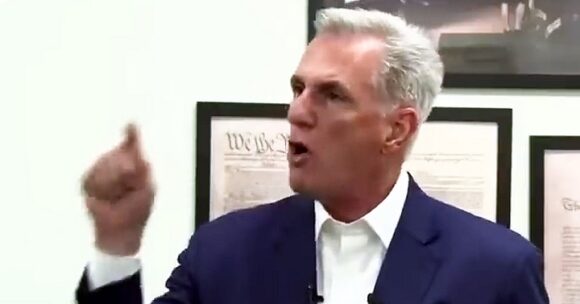Dear Commons Community,
Representative Kevin McCarthy, who this fall became the first speaker to be ousted from power in the middle of a congressional term, said yesterday he will resign from office at the end of this month.
His exit is a blow to his successor, Speaker Mike Johnson, and House Republicans, further cutting the already narrow GOP majority and making passing legislation in 2024 even more challenging.
“No matter the odds, or personal cost, we did the right thing. That may seem out of fashion in Washington these days, but delivering results for the American people is still celebrated across the country,” McCarthy, R-Calif., wrote in an op-ed in The Wall Street Journal.
“It is in this spirit that I have decided to depart the House at the end of this year to serve America in new ways. I know my work is only getting started,” he said.
“I will continue to recruit our country’s best and brightest to run for elected office,” McCarthy added. “The Republican Party is expanding every day, and I am committed to lending my experience to support the next generation of leaders.” As reported by NBC News.
McCarthy’s timeline means he would depart before the Feb. 13 special election to replace expelled Rep. George Santos, R-N.Y., further cutting the Republican majority to 220 members to 213 Democrats. That means House Republicans could lose just three votes before they require Democratic support to pass measures.
“Today I sit here having served as your whip, leader and as the 55th speaker of the House,” he says in the video, citing a list of achievements he’s proud of. “We kept our government operating and our troops paid while wars broke out around the world. … I have faith in this country.”
“Now, it is time to pursue my passion in a new arena,” McCarthy says, without going into detail about his next move.
McCarthy was ousted as speaker on Oct. 3, setting off a contentious race to replace him. Eight Republican rebels, led by Matt Gaetz of Florida, forced out the speaker midsession for the first time in history. That night, McCarthy said he feared “the institution fell today” and quipped that he made a mistake in helping get some of those eight GOP lawmakers elected.
Some McCarthy allies warned that the House vacancies could spell trouble for Republicans in the New Year.
“Congratulations Freedom Caucus for 105 Rep who expel our own for the other,” Rep. Marjorie Taylor Greene, R-Ga., said on X. “I can assure you Republican voters didn’t give us the majority to crash the ship. Hopefully no one dies.”
McCarthy’s departure had long been anticipated since his ouster, although his decision to leave before the end of the term will create fresh headaches for his party. Republicans have struggled to pass GOP appropriations bills this fall, and their slimmer majority next year could make it more difficult to pass GOP messaging bills or an impeachment resolution in a key election year.
McCarthy, 58, represents a solidly Republican district based in Bakersfield, California, which his party is expected to hold onto when it comes before voters again in a special election.
But the seat will be vacant for months. California state law says that after a vacancy occurs, the governor must set a special election within two weeks. The special election must be conducted 126 to 140 days after the governor’s proclamation.
In a statement on X, the new speaker, Johnson, R-La., wished McCarthy well.
“Kevin served the American people and his constituents in California’s Central Valley with honor for nearly two decades,” Johnson said, accompanied by a photo of the two.
“As the Republican Leader, he helped secure the House Republican majority twice, and as Speaker he led the People’s House in its return to regular order after Pelosi’s Covid lockdowns,” he added, referring to McCarthy’s predecessor as speaker, Nancy Pelosi, D-Calif.
For McCarthy, winning the speaker’s gavel in January after a grueling 15-ballot floor fight was the pinnacle of a long political career in Sacramento and Washington.
McCarthy, a former staffer for then-Rep. Bill Thomas, R-Calif., was GOP leader of the California Assembly when Republican Arnold Schwarzenegger was governor, before he succeeded his former boss in the House in 2007.
Ahead of the 2010 midterms, McCarthy teamed with two other conservative rising stars in the party — then-Reps. Paul Ryan of Wisconsin and Eric Cantor of Virginia — charting a road map to win back the House by tackling debt and the deficit and attacking Obamacare. A tea party wave swept Republicans into power that fall, and the trio known as “the Young Guns” took much of the credit.
McCarthy, one of the GOP’s most prolific fundraisers, would hold nearly every major leadership position before he was elected speaker: chief deputy whip, majority whip, majority leader and minority leader.
His ouster this year wasn’t the first time he had clashed with conservative bomb throwers. After Speaker John Boehner, R-Ohio, suddenly resigned in 2015, McCarthy, the heir apparent, ran to replace him but abruptly dropped out of the race on the day of the election because of opposition from the Freedom Caucus — the same group that would help oust him as speaker eight years later, almost to the day.
His decision to bow out and fight another day eventually allowed him to rise to the top job this January. But McCarthy continued to tangle with rabble-rousers in his own party over things like raising the debt ceiling and spending.
And after he averted a government shutdown by passing a short-term funding bill backed by Democrats and the White House, conservatives moved against him, making him the first speaker in history to be removed through a motion to vacate.
Good luck, Mr. McCarthy!
Tony



